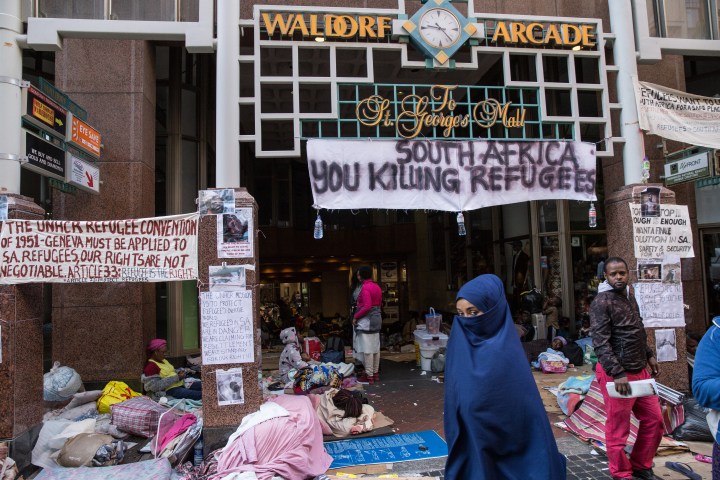Xenophobia
Clock ticking for Cape Town refugees housed in temporary shelters

There’s no official date for when the Wingfield and Paint City temporary shelters in Cape Town will close down, but talks are already underway to reintegrate the refugees housed there. The groups have been voluntarily homeless since embarking on protest action in October 2019.
Refugees housed in temporary shelters at Wingfield Military Base and Paint City may soon be forced to leave when the sites close down.
The City of Cape Town has not indicated when the shelters will be decommissioned, but according to Executive Director for Safety and Security Richard Bosman, the City and the national Department of Home Affairs are in talks with the groups to find a “sustainable solution” to reintegrate them into the community.
“The implementation, once approved, will be done within the parameters of the National Disaster Management Act regulations. The process has not been finalised yet,” said Bosman.
According to refugee leader Papy Sukami, the group at Wingfield was initially told the site would close down by 16 June.
Sukami says the date was then pushed back to 31 July.
“They brought to us two conditions: we have to choose between repatriation (what they are calling deportation) and reintegration,” he told Daily Maverick.
Aline Bukuru, the wife of rival refugee leader Jean-Pierre Balous, did not respond to queries from Daily Maverick about when the group at Paint City in Bellville may relocate.
Balous is in custody after trying to escape from the dock during a court appearance on 7 March.
Home Affairs Minister Aaron Motsoaledi had warned that should the refugees refuse reintegration efforts, they would be repatriated.
Sukami says the group at Wingfield is willing to accept reintegration if there is a clear roadmap on how it will be implemented.
“When they are talking about reintegration, we told them they need to present us with a kind of a programme: ‘How are people going to rent, where are they going to be where they can be safe? What about the future and their survival? Will they get a small job or what?’ ”
After the announcement of the lockdown, 560 refugees were relocated from inside the Central Methodist Church on Greenmarket Square to Paint City, while a further 350 were moved from outside the Cape Town Central Police Station to the separate Wingfield site.
This is according to figures given by the Department of Home Affairs in late April.
Since October 2019, the refugees had been protesting against xenophobic treatment in South Africa and were demanding group resettlement abroad. This, however, was refused by the United Nations High Commissioner for Refugees (UNHCR) as it was against its policies.
For the duration of the Covid-19 pandemic, the UNHCR has temporarily suspended all global resettlement efforts.
The refugees, who had sought shelter at the Methodist church after being forcibly removed from the Waldorf Arcade, had split into two hostile factions. The group aligned with Sukami was forced to sleep outside the church and was later evicted by the City of Cape Town for flouting by-laws. They had been camping outside the Central Police Station when they were relocated to Wingfield.
Sukami, originally from the DRC, says repatriation will threaten their safety.
“It’s not safe. Any time things can change in Congo and it’s going to bring again violence. We cannot go to such a place.”
He is still adamant that the group wants to leave South Africa and hopes resettlement will be possible when the pandemic subsides. DM


















 Become an Insider
Become an Insider